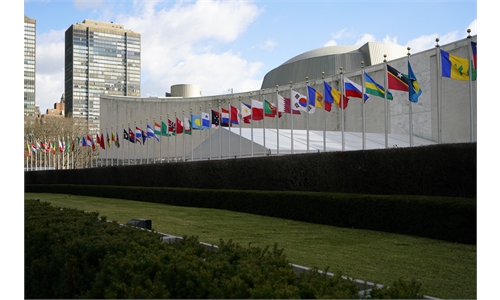
Former Belgian prime minister Yves Leterme Photo: Courtesy of Leterme
Editor's Note:
The ongoing Ukraine crisis, triggered by the US-led NATO's repeated eastward expansion, has aroused reflection on the international security system among the international community. The unilateralist security architecture dominated by the US has brought a great deal of conflict and instability to the world. The new era calls for a new security. How will the China-proposed Global Security Initiative contribute to global security? What is the take of a European toward NATO's five rounds of eastward expansion? Yves Leterme (Leterme), former Belgian prime minister, shared his insights on these topics with Global Times (GT) reporter Lu Yuanzhi. Leterme also shared his view on different approaches toward COVID-19 epidemic control among different countries.
GT: The Russia-Ukraine conflict is now the focus across the world. From a non-European perspective, NATO's eastward expansion to Russia's doorstep is the root of the Ukraine crisis. As a European, what's your take on the bloc's five rounds of eastward expansion?
Leterme: I represented Belgium at the NATO-Summit in Bucharest in 2008 when different former nations that were part of the Soviet bloc were awarded NATO-Membership Application Programs. The demand for NATO membership was tabled by the leaders of these new independent nations.
The fact that the expansion of NATO came quite early after the collapse of the Soviet system certainly created some legitimate concerns and resentment outside of Europe and the US.
However, these concerns can never be used as an argument for the unacceptable, unilateral aggression and violation of the territorial integrity of Ukraine as a sovereign country by President [Vladimir] Putin.
GT: Chinese President Xi Jinping in April proposed a Global Security Initiative which stressed a commitment to the vision of common, comprehensive, cooperative and sustainable security. The US-led unilateralist security architecture has brought a great deal of conflict and instability to the world. The new era calls for a new security. What do you think of President Xi's proposal?
Leterme: I have read the statement by President Xi. I agree with the need for a new global security and with the underpinning principles put forward. I hope that leaders from all over the globe will join the debate and agree on a strengthened multilateral framework that can be a guarantor of the six principles and of the global security. China is the key partner to make lasting peace prevail.
GT: Some European leaders underline Europe's strategic autonomy. How do you see the prospect of European strategic autonomy? Against the backdrop of Europe's pursuit of strategic autonomy, what's your opinion about the future of China-EU cooperation?
Leterme: I think the European Union should - notwithstanding the productive cooperation and strong ties - avoid being just a "junior partner" of the United States. The European Union needs to take own positions in the interests of its citizens and in order to rebuild strong and better-balanced global multilateral cooperation.
The European Union is part of the Eurasian continent. Given the impressive progress made by China in all domains and the leading role of China in the future of the world, it is in the interest of the Europeans to deepen the cooperation with China. This must be one of the leading principles of the European position in global affairs. The goal of deepening the friendship and cooperation with China should prevail over the differences in opinion that sometimes create turbulences in the EU-China relations. Some European politicians should invest more in a sincere, respectful and open-minded interaction with China. The opening of China to the world and the increasing role China is taking up in multilateral organizations should be better welcomed.
GT: You posted a piece entitled "COVID-19's lessons for democracies" this March. The novel coronavirus has resulted in 15 million deaths across the world. Do you think democracies have learned sufficient lessons to better deal with the COVID-19 in the future?
Leterme: It is a fact that Western democracies have been reacting with some avoidable delay to the extremely rapid spread of COVID-19. This has certainly led to human suffering and economic damage that could have been prevented.
Democracies have a very important self-correcting dynamic. Lessons have been learned from the pandemic and are leading to better preparedness to counter future health crises. I am advocating for a systematic review of emergency planning and increased capacity of effective risk and disaster management.
GT: When the number of Omicron infections worldwide is ramping up, most Western countries have reopened their economies. In the absence of full knowledge of the novel coronavirus, do you think that adopting some measures to control and prevent the spread of the virus is still necessary?
Leterme: In most cases, the policy to counter the spread of the pandemic and the human suffering and casualties has been based on striking a balance between the need to effectively counter and overcome the pandemic through very tough restrictions and on the other hand, trying as much as possible to safeguard the continuity of the core activities of the societies and the functioning of vital parts of the economy. It is good that even today there are still some limitations to free movement and mandatory protection measures like masks and vaccines. We should be prepared for a surge of the number of infections.
GT: The US co-hosted the second Global COVID-19 Summit in May. It has also long passed the mark of more than 1 million COVID-related deaths, the highest figure of any country. What's your take on this?
Leterme: The US has indeed been very severely hit. To a certain extent this is due to a kind of denial at the beginning of the pandemic and the priority given to the further functioning of the economy. Then president of the US, Mr Donald Trump, also made effective measures against the spread of the virus more difficult by erratic communication.
GT: During the epidemic, it seems that developed Western countries have not showed their due leadership toward the world. Instead, they have displayed some chaotic, selfish moves. This seems to have resulted in damage to the West's overall image. What is your opinion on the ability of Western countries to provide public goods in the future?
Leterme: Analyzing the way the needs of the developing countries have been addressed, it is clear that more solidarity could have been displayed. I have, together with colleagues, been asking for an exceptional lifting of the intellectual property rights on the vaccines that were quite rapidly produced by the pharmaceutical industry. The COVID-19 virus has also turned out to be an inequality virus. Within our Western societies, poorer people were more exposed to infection and people with lower-paid jobs had to face the potential risk and could not work from home. Protection against infection through vaccination has not yet been sufficiently and fairly spread over the world. The developing world is still lagging behind. This is very worrying, not the least since no world citizen is 100 percent safe until everybody is safe. Western countries could indeed do more to make vaccines and other prevention accessible as public goods.

